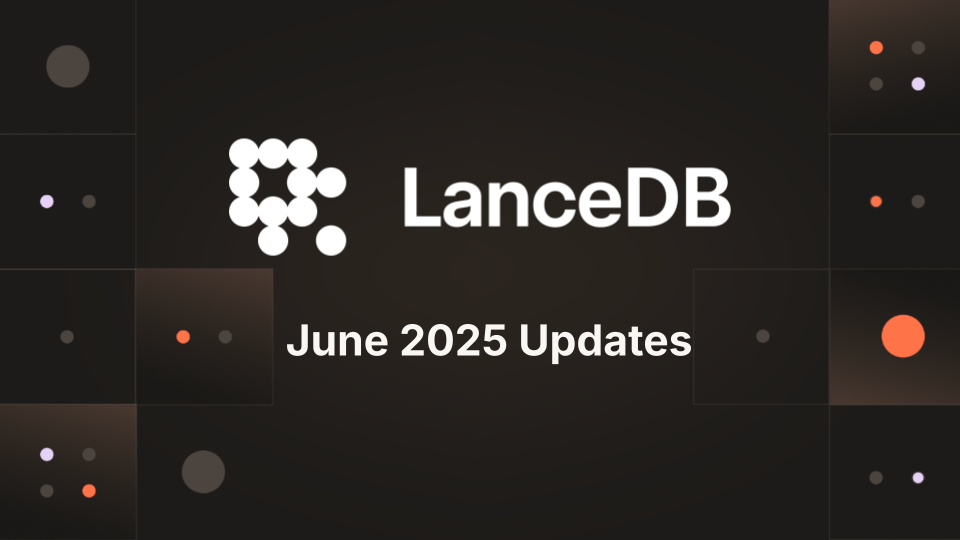About Dosu
Dosu is giving time back to engineers by turning your codebase into a living knowledge base, so you can build instead of answering questions and maintaining docs all day. It generates docs, helps maintain them, answers questions on issues and auto-labels pull requests, issues and discussions on GitHub. With seamless integration into GitHub and Slack, Dosu provides context aware, conversational assistance that reduces manual toil and accelerates development workflows.
LanceDB powers Dosu’s performance engine for multimodal search at scale. Its unique blend of blazing-fast vector + full-text search, built-in reranking, and immutable versioning enables Dosu to handle massively changing datasets (like code, docs, and discussions) with millisecond latency and full historical traceability. LanceDB’s lightweight, local-first architecture makes it ideal for secure on-prem deployment and rapid iteration for local development.
By building on LanceDB, Dosu doesn’t just respond. It anticipates, accelerates, and elevates how teams build software.
From Prototype to Production: The Dosu Success Story
In today’s fast-moving software landscape, Dosu has emerged as the intelligent knowledge base trusted by modern software teams. With over 50,000 GitHub installations and as an official partner of the Cloud Native Computing Foundation (CNCF), Dosu transforms AI from a passive tool into an active, context-aware collaborator.
Dosu learns your architecture, patterns, and decisions across GitHub and Slack, proactively surfacing relevant Dosu-generated documentation on PRs, answering questions, and resolving issues in context. At the core is a hybrid Retrieval-Augmented Generation (RAG) system powered by high-performance vector search that weaves code, conversations, and documentation into a unified, searchable knowledge graph.
For organizations, Dosu is more than a productivity boost. It’s a strategic layer that aligns helps to ensure knowledge stays up to date and accurate, so software teams and AI Agents can make better decisions without having to spend half their day on manual maintenance. It helps teams onboard faster, reduces maintenance overhead and preserves institutional knowledge.
For Agents, specifically, Dosu is a must have to ensure LLM systems make good decisions based on up to date information, rather than stale documentation. This is an increasingly pernicious problem where agentic AI makes more frequent codebase changes, resulting in documentation that’s more difficult to keep up to date, which could lead other AI systems to have wrong or stale context and make increasingly inaccurate decisions. Dosu addresses the problem ensuring documentation stays up to date as when changes in code are detected.
Dosu isn’t just another AI copilot. It’s your always-on intelligent knowledge base, keeping on top of new knowledge when it’s created, maintaining context, and accelerating how software teams and the agentic systems that support them build the future.
The Challenge
pgvector Didn’t Quite Work Out
To power core features like auto-labeling, context-aware documentation, and proactive Q&A, Dosu initially turned to pgvector, a straightforward solution that handled basic vector search. But as their AI platform matured, the engineering team hit a major bottleneck.
Dosu’s core features: auto-labeling, Issue Triage + Q&A, generate docs
Figure 1: Auto-labelling of GitHub issues and pull requests

Figure 2: GitHub issue triage and question-answering capabilities

As Dosu’s AI-powered platform matured, its initial choice of pgvector quickly became a bottleneck. With each model iteration, adjusting embedding dimensions, updating schemas, testing similarity metrics, engineers faced tedious database migrations. These migrations, once occasional, became a daily hurdle, especially during rapid prototyping. Instead of building product features, engineers were writing scripts to keep their database in sync.
Performance limitations compounded the problem: deploying pgvector in production was fragile, and scalability was limited. Dosu needed a fundamentally different approach, a vector database that can prioritize developer experience without sacrificing performance at scale, while remaining lightweight enough for seamless deployment.
The Ideal Vector Database for Dosu: LanceDB
That’s when Dosu found LanceDB, a solution that immediately felt like a perfect fit. From day one, LanceDB delivered on every requirement, transforming their workflow:
| Feature | Description |
|---|---|
| Superior Developer Experience | LanceDB’s intuitive APIs and robust tooling drastically reduced the time from idea to production, from months to days, empowering Dosu’s team to prototype, test, and deploy faster than ever before. |
| Lightweight On-Premises Deployment | With full support for isolated, on-prem deployments, Dosu could ensure customer source code never left internal environments, an absolute must-have for enterprise adoption. |
| Real-Time Synchronization | LanceDB enabled seamless, continuous ingestion from diverse sources like GitHub, issue trackers, and Slack, indexing data in real time so AI assistants always worked with the most up-to-date context. |
| Advanced Hybrid Search | Combining full-text and vector search with integrated rerankers, LanceDB delivered highly relevant results while preserving the flexibility to support Dosu’s custom ranking models that are tailored for code semantics and developer intent. |
| Time-Travel Versioning | Built-in support for versioned queries meant Dosu could track code evolution, query historical states, and enable AI to reason over not just the present, but the past, understanding how solutions evolved and accessing historical context for better decision-making. |
The Solution
Within just a few weeks, Dosu successfully integrated LanceDB into their production environment and scaled it to support thousands of customers. With infrastructure friction eliminated, the team’s development velocity surged. Engineers could finally shift their focus from maintaining database scaffolding to building product features that matter. LanceDB unlocked the freedom to innovate without compromise.
With pgvector, every change meant a new migration. LanceDB lets us avoid the overhead and just point to a directory for local development. It’s helped our developers build, test and ship faster! Pavitra Bhalla, Engineer @ Dosu
With LanceDB, Dosu’s engineers shifted their focus from maintaining database scaffolding to building product features that matter. The result: faster prototyping, easier local development, and rapid scaling to thousands of customers. See how to get started.
Figure 3: LanceDB as part od Dosu’s architecture

Dosu ingests and synthesizes multimodal development data, including source code, GitHub activity, and documentation, to build a living knowledge graph that reflects the state and evolution of a software project. It transforms code structures like functions and classes into semantic embeddings, while also embedding context from related issues, pull requests, and discussion threads. This enriched data, tagged with structured metadata such as repository identifiers, timestamps, and file paths, is stored and indexed in LanceDB for high-performance retrieval.
LanceDB’s flexible architecture allows Dosu to support both real-time ingestion of new activity and batch processing of historical data. Whether it’s a freshly opened pull request or a legacy code review thread, everything is searchable within milliseconds thanks to LanceDB’s SSD-optimized hybrid index and auto-tuned performance.
Auto-Labeling GitHub Issues
Dosu automatically triages GitHub issues and PRs by embedding their content and running hybrid semantic searches against the LanceDB index. It identifies similar past cases, ranks them based on context and scope, and uses this information to apply accurate, context-aware labels - achieving over 90% accuracy. This automation reduces manual triage by up to 70%, particularly in high-traffic open source projects. This reduces manual triage by up to 70%, accelerating response time and enabling maintainers to focus on higher-leverage work.
Documentation Generation
To keep internal documentation fresh and relevant, Dosu continuously pulls relevant signals from LanceDB’s knowledge base, including commits, discussions, and historical annotations. It then synthesizes accurate, up-to-date references like architecture diagrams, API guides, and changelogs, which can be auto-committed to source repositories. The entire process is powered by LanceDB’s built-in versioning, enabling teams to audit how documentation was generated and roll back or compare versions as needed.
This transparency and traceability make Dosu suitable for compliance-heavy environments, while also accelerating iteration in fast-moving teams. With LanceDB’s intuitive, file-based setup, developers can build and test locally with zero migration overhead and full reproducibility.
The Result
By simplifying everyday workflows while maintaining high-performance hybrid search and versioned storage, LanceDB aligns perfectly with Dosu’s mission: to empower developers with tools that are fast, reliable, and easy to use. Integrating LanceDB-powered AI intelligence has revolutionized how engineering teams manage and scale their codebases with Dosu:
| Benefit | Details |
|---|---|
| Rapid Time-to-Value | Dosu delivers value quickly. Prototypes are up in hours and production deployments in weeks. Teams can automate 80% of GitHub issue labeling within days using built-in LanceDB integrations. |
| Point-in-Time Intelligence | LanceDB’s versioning lets Dosu offer historical insight into your codebase. Teams can trace decisions, debug AI behavior, and query knowledge snapshots from any point in time. |
| Enterprise-Grade Performance | Dosu supports high-scale performance with tens of milliseconds query speeds, even across millions of vectors. It processes over thousands of GitHub events daily on moderate hardware, outperforming heavier alternatives by 10x in efficiency. |
LanceDB powers the heart of our AI at Dosu. Its lightning-fast search, built-in versioning, and effortless scalability let us move faster, ship smarter, and deliver cutting-edge intelligence to millions of developers—without compromise. Devin Stein, Founder and CEO @ Dosu
The Road Ahead: Smarter, Safer, and More Context-Aware AI Development
Looking ahead, Dosu is charging into its next chapter with bold upgrades to further their mission of providing an always up to date, intelligent knowledge base that can be a trusted source of truth for agents and people alike to use for making better decisions. Advanced versioning will bring powerful new tools for traceability - enabling tagging, annotations, and automated evaluation to track and refine model behavior with surgical precision.
With deeper integration into tools and wikis, Dosu will unlock richer, domain-specific intelligence - turning organizational knowledge into up to date, accurate, actionable insight. The future of software development that Dosu is building is one where knowledge is up to date by default, and accessible to all.




